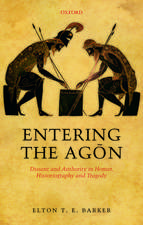Roots of Brazil: Kellogg Institute Series on Democracy and Development
Autor Sérgio Buarque De Hola, G. Harvey Summen Limba Engleză Paperback – 14 oct 2012
Sérgio Buarque de Holanda's Roots of Brazil is one of the iconic books on Brazilian history, society, and culture. Originally published in 1936, it appears here for the first time in an English language translation with a foreword, "Why Read Roots of Brazil Today?" by Pedro Meira Monteiro, one of the world's leading experts on Buarque de Holanda.
Roots of Brazil focuses on the multiple cultural influences that forged twentieth-century Brazil, especially those of the Portuguese, the Spanish, other European colonists, Native Americans, and Africans. Buarque de Holanda argues that all of these originary influences were transformed into a unique Brazilian culture and society—a "transition zone." The book presents an understanding of why and how European culture flourished in a large, tropical environment that was totally foreign to its traditions, and the manner and consequences of this development. Buarque de Holanda uses Max Weber’s typological criteria to establish pairs of "ideal types" as a means of stressing particular characteristics of Brazilians, while also trying to understand and explain the local historical process. Along with other early twentieth-century works such as The Masters and the Slaves by Gilberto Freyre and The Colonial Background of Modern Brazil by Caio Prado Júnior, Roots of Brazil set the parameters of Brazilian historiography for a generation and continues to offer keys to understanding the complex history of Brazil.
Roots of Brazil has been published in Italian, Spanish, Japanese, Chinese, German, and French. This long-awaited English translation will interest students and scholars of Portuguese, Brazilian, and Latin American history, culture, literature, and postcolonial studies.
"Roots of Brazil, first published in 1936 and substantially revised in subsequent editions, is one of those works that shapes its readers' imagination, a book that in a certain sense 'invents' its country, serving as a mirror in which, while seeking their own image, Brazilian readers have also found their own attitudes and inclinations. On the other hand, Sérgio Buarque de Holanda's book functions not only as a fixed portrait that preserves a scene from the past but also as a bright surface that can reflect each new historical moment." —from the foreword by Pedro Meira Monteiro, Princeton University
Din seria Kellogg Institute Series on Democracy and Development
-
 Preț: 222.01 lei
Preț: 222.01 lei - 19%
 Preț: 450.29 lei
Preț: 450.29 lei -
 Preț: 365.21 lei
Preț: 365.21 lei -
 Preț: 277.23 lei
Preț: 277.23 lei -
 Preț: 277.53 lei
Preț: 277.53 lei -
 Preț: 173.49 lei
Preț: 173.49 lei -
 Preț: 284.82 lei
Preț: 284.82 lei -
 Preț: 299.65 lei
Preț: 299.65 lei -
 Preț: 243.30 lei
Preț: 243.30 lei -
 Preț: 279.23 lei
Preț: 279.23 lei - 27%
 Preț: 701.59 lei
Preț: 701.59 lei -
 Preț: 162.65 lei
Preț: 162.65 lei -
 Preț: 221.38 lei
Preț: 221.38 lei -
 Preț: 216.16 lei
Preț: 216.16 lei -
 Preț: 180.06 lei
Preț: 180.06 lei -
 Preț: 157.58 lei
Preț: 157.58 lei -
 Preț: 232.16 lei
Preț: 232.16 lei - 15%
 Preț: 456.46 lei
Preț: 456.46 lei - 23%
 Preț: 591.49 lei
Preț: 591.49 lei -
 Preț: 276.55 lei
Preț: 276.55 lei - 23%
 Preț: 588.22 lei
Preț: 588.22 lei -
 Preț: 199.49 lei
Preț: 199.49 lei - 27%
 Preț: 699.35 lei
Preț: 699.35 lei -
 Preț: 280.96 lei
Preț: 280.96 lei -
 Preț: 367.12 lei
Preț: 367.12 lei - 27%
 Preț: 697.53 lei
Preț: 697.53 lei -
 Preț: 205.64 lei
Preț: 205.64 lei -
 Preț: 464.59 lei
Preț: 464.59 lei -
 Preț: 443.72 lei
Preț: 443.72 lei -
 Preț: 243.30 lei
Preț: 243.30 lei -
 Preț: 254.37 lei
Preț: 254.37 lei -
 Preț: 324.83 lei
Preț: 324.83 lei -
 Preț: 354.99 lei
Preț: 354.99 lei -
 Preț: 200.26 lei
Preț: 200.26 lei -
 Preț: 325.43 lei
Preț: 325.43 lei -
 Preț: 177.57 lei
Preț: 177.57 lei -
 Preț: 173.91 lei
Preț: 173.91 lei -
 Preț: 275.43 lei
Preț: 275.43 lei -
 Preț: 300.58 lei
Preț: 300.58 lei -
 Preț: 252.64 lei
Preț: 252.64 lei -
 Preț: 275.40 lei
Preț: 275.40 lei -
 Preț: 244.94 lei
Preț: 244.94 lei -
 Preț: 298.67 lei
Preț: 298.67 lei -
 Preț: 156.23 lei
Preț: 156.23 lei
Preț: 202.32 lei
Nou
Puncte Express: 303
Preț estimativ în valută:
38.71€ • 39.94$ • 32.31£
38.71€ • 39.94$ • 32.31£
Carte tipărită la comandă
Livrare economică 27 martie-10 aprilie
Preluare comenzi: 021 569.72.76
Specificații
ISBN-13: 9780268026134
ISBN-10: 0268026130
Pagini: 232
Dimensiuni: 151 x 227 x 14 mm
Greutate: 0.39 kg
Ediția:1st Edition
Editura: MR – University of Notre Dame Press
Seria Kellogg Institute Series on Democracy and Development
ISBN-10: 0268026130
Pagini: 232
Dimensiuni: 151 x 227 x 14 mm
Greutate: 0.39 kg
Ediția:1st Edition
Editura: MR – University of Notre Dame Press
Seria Kellogg Institute Series on Democracy and Development
Recenzii
“Considered by most historians to be one of three foundational books in Brazilian historiography, this first English translation of Raizes do Brasil will be important to the study of Brazilian history. . . . The author examined Brazil’s colonial formation and identified foundational features and characteristics that made Brazil different from other countries.”
“This excellent edition includes not only a lively translation of the original, but also the author’s prefaces to both the second and third editions of 1948 and 1956, literary scholar Antonio Candido’s limpid introduction to the 1967 edition and his postscript to the 1987 edition, and Pedro Meira Monteiro’s new foreword. The result is a rich, layered work of commentary and annotation. Reading this edition is itself an exercise in intellectual history.”
Notă biografică
Sérgio Buarque de Holanda (1902–1982) was one of the most renowned Brazilian historians of the twentieth century, as well as a noted literary critic. He taught in Italy, the United States, Chile, and Brazil.














